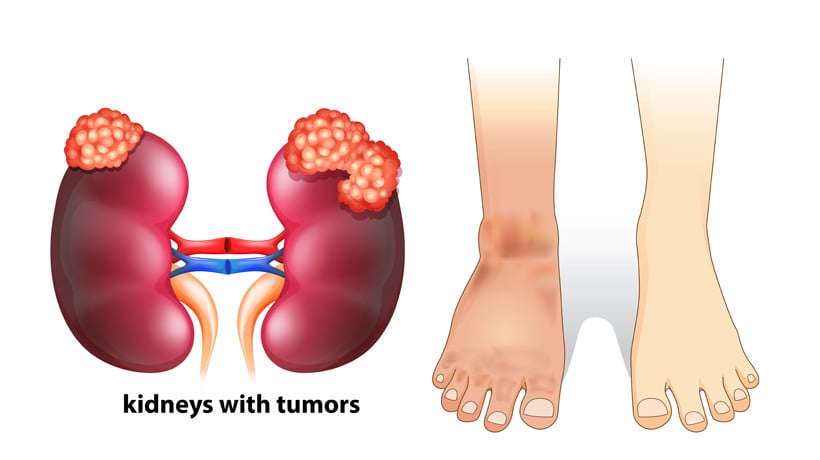One of the most important organs in the body that maintains your homeostasis is the kidney, and it’s optimal to have two of them for a smooth-running system. Unfortunately, because these organs are so central to normal functions like filtering extra water and wastes out of your blood and producing urine, there are many kidney-related problems that can develop over a lifetime. While some are less common than others, it’s important to be aware that they can arise unexpectedly from other complications and non-hereditary diseases. Be on the lookout for these six kidney problems.
Chronic kidney disease
One main kidney-related disease is chronic kidney disease (CKD) and it occurs when your kidneys are damaged and they can’t filter blood as they should. It’s “chronic” because the damage happens to your kidneys over a prolonged period of time, but it is recognizable by testing your blood and urine for abnormalities. These can include signs of increased levels of protein in the urine or blood. In the US, CKD is common and occurs in more than 30 million Americans. Those with high blood pressure, diabetes, heart disease, and/or a family history of kidney failure are more likely to develop this disorder, especially those who have had this disorder for a long period of time.
Kidney stones
Another common kidney-related issue involves the more temporary but uncomfortable condition of kidney stones. According to the National Institute of Diabetes and Digestive and Kidney Diseases (NIDDK), “A kidney stone is a solid, pebble-like piece of material that can form in one or both of your kidneys when high levels of certain minerals are in your urine.” Symptoms include a sharp pain in your back or side.
If not treated, kidney stones can cause urinary tract infections, severe pain, loss of kidney function, or blood in the urine. While there are several different types of kidney stones, those who take certain medications, have chronic inflammation, are obese, already have kidney complications, or simply don’t drink enough water may be more at risk for developing kidney stones.
Kidney cancer
Kidney or renal cancer is a less common kidney-related condition that occurs when kidney cells become malignant (cancerous) and grow out of control, forming a tumor. According to WebMD, most kidney cancers first appear in the lining of tiny tubes in the kidney (a type of cancer called renal cell carcinoma). This type of cancer tends to affect more individuals over the age of 40, especially those who have kidney issues, have high blood pressure, have lymphoma, use prescription drugs frequently, and have certain genetic conditions relating to the kidneys. Symptoms include blood in the urine, unexplained weight loss and loss of appetite, swelling in the legs, and a pain in the side that won’t go away.
Kidney cysts
Kidney cysts are another complication involving the kidneys where fluid-filled sacs form in the kidneys. According to the NIDDK, simple kidney cysts are different from the cysts that develop when a person has polycystic kidney disease (PKD), which is a genetic disorder. Simple kidney cysts do not enlarge the kidneys, replace their normal structure, or cause reduced kidney function like cysts do in people with PKD. As with other kidney issues, these are more common in people as they age, as 50 percent of people age 50 and older have simple kidney cysts. These cysts typically don’t have symptoms, but can cause discomfort if they rub against other organs; as a result, cysts do not usually require treatment.
Lupus
Lupus nephritis is a kidney-related disease that stems from systemic lupus erythematosus, an autoimmune disease. This disorder causes the body’s healthy tissue to attack itself, including organs like the kidneys. Lupus is more common in women and men, and especially in minorities. Symptoms include foamy urine and edema, and broadly, lupus symptoms can also include joint pain, muscle pain, and a fever with no cause. As in other kidney-related disorders, lupus nephritis can be managed by monitoring blood and urine tests to check for abnormal levels of protein or traces of blood.
Kidney infection
Kidney infections are another affliction in which bacteria or viruses infect one or both of your kidneys, stemming from an initial lower urinary tract or bladder infection. According to the NIDDK, kidney infections cause most of the 100,000 hospital visits for UTIs in the United States each year. Kidney infections can be very painful, and they may cause high blood pressure, kidney failure, or permanent kidney scarring.
Sources:
https://www.webmd.com/cancer/understanding-kidney-cancer#2
https://www.niddk.nih.gov/health-information/kidney-disease



